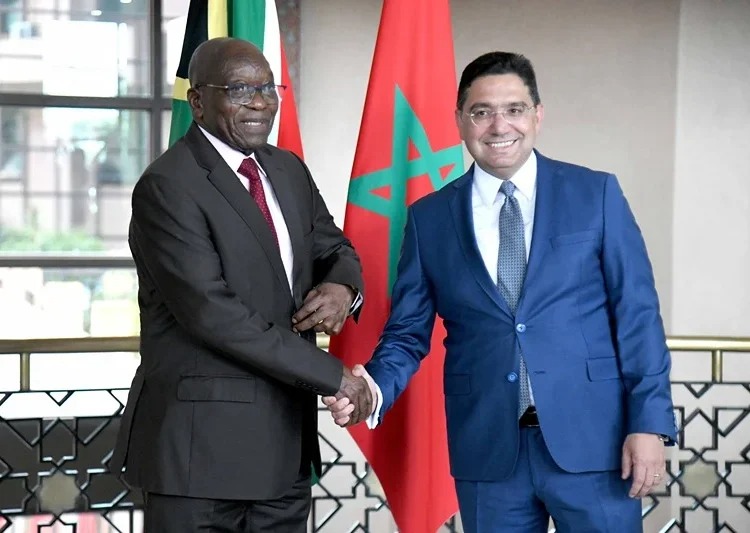
Former South African President Jacob Zuma, now head of the opposition Umkhonto we Sizwe (MK) party, visited Morocco on July 15, 2025, to meet with officials, including Foreign Minister Nasser Bourita.
During this visit, Zuma openly expressed his support for Morocco’s autonomy plan for the Sahara.
This stance irritated the authorities in Pretoria, who reacted nervously, highlighting internal fault lines, particularly on an issue where the country led by Cyril Ramaphosa appears increasingly isolated.
Jacob Zuma’s statement in support of Morocco’s proposed autonomy plan for the Sahara had a particularly notable impact, as it clearly unsettled South Africa’s Department of International Relations and Cooperation (DIRCO).
Rather than addressing the substance of the declaration, DIRCO chose to divert attention to a secondary issue: the use of national symbols, particularly the South African flag, during the meeting between Mr. Zuma and the Moroccan Minister of Foreign Affairs.
This outburst, more formal than political, struggles to conceal a deeper discomfort—that of a government facing the symbolic dissent of a former head of state, a historic figure of the anti-apartheid struggle, who now serves as a spokesperson for an alternative vision on the Sahara issue.
This visit not only shook Pretoria, but also highlighted an intrinsic fracture and isolation within the South African government, shedding light on a truth that is difficult for the ruling regime’s leaders to digest: the government’s hostility toward the Kingdom is not unanimous in South Africa.
Moreover, it also demonstrates that the country’s vital forces, particularly political, intellectual, and social, have their say; they can express clear-sighted and responsible positions that differ from the official position. Furthermore, when it comes to foreign relations, Morocco has never deviated from its policy of respecting sovereignty, clarity, and responsibility.
This is what characterized the former South African President’s visit to the Kingdom.
According to sources close to the matter, the visit was well prepared with the assistance of the respective diplomatic missions of the two countries.
Moreover, the South African Embassy in Rabat requested, in a note verbale, protocol treatment worthy of the former South African President.
Therefore, protesting against the presence of the South African flag appears to be a clumsy attempt to reverse the situation.
These same sources revealed that the flag was only used at the express request of Mr. Zuma himself. It is also a sign of respect for an African figure who was one of the great voices of contemporary Africa.
Pretoria’s reaction to Jacob Zuma’s visit conveys the image of a government uncomfortable with the political diversity inherent in South African democracy.
Pluralism is a major foundation of this democracy, and the MK party, although recently created, is part of the historical continuity of the struggle for freedom. It is represented in Parliament and enjoys growing public support.
For its part, Morocco takes no part in South Africa’s internal debates. As a sincere African partner, Rabat fully respects the diversity of political opinions expressed within this sister country. The MK party’s announcement of a press conference in response to the DIRCO press release confirms that Jacob Zuma’s statement in Rabat was neither improvised nor anecdotal. It reflects a carefully considered view on an issue of continental interest.
The Kingdom of Morocco remains faithful to its tradition of diplomatic openness, based on sovereignty, transparency, and consistency. It regularly welcomes African, Arab, European, Asian, and American representatives in a spirit of dialogue and mutual respect. In October 2024, an official ANC delegation, led by Obed Bapela, was received by the Moroccan Ministry of Foreign Affairs—proof of Morocco’s willingness to engage with all South African political persuasions, without ever seeking to divide.
Regarding the protocol controversy over the use of the flag, it should be recalled that the use of national symbols in non-governmental contexts—including sporting, cultural, or civil—is a common practice internationally. Morocco complied with this practice with respect, in a dignified setting, and without any hidden political agenda.
It is also worth recalling that some South African representatives have, in the past, flown their national flag at international events directly hostile to Moroccan sovereignty, without this provoking any official reaction from Rabat.
In contrast, Morocco acts consistently and calmly. Its position on the Sahara issue is based on historical and legal foundations and enjoys growing support across the continent. Today, more than two-thirds of African countries explicitly support Moroccan sovereignty over the Sahara or adopt a constructive stance on the matter. The Kingdom is part of an African dynamic that prioritizes stability, state sovereignty, and realism.
Finally, Morocco reaffirms its deep respect for the South African people and remains available for a frank and open dialogue with Pretoria, a dialogue that goes beyond the ideological logic inherited from the Cold War.

